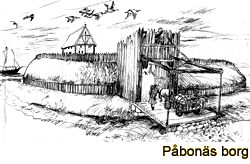Meet the Middle Ages
BackPåbonäs

The stronghold of Påbonäs was strategically placed on the coast not far from the Danish border. During the 14th century, members of the German gentry - Puke, Glysing and van Vitzen - lived here.
Påbonäs was built during the early 14th century. At this time, the gentry became more powerful. Sir John Kettilsson Puke may have been in charge of its fortification. He wrote a letter from the manor house in 1339. Some years later, there is evidence of a letter written at Påbonäs by one of his relatives, Puke Glysing. During the second half of the 14th century the stronghold changed hands. Through marriage the van Vitzen family partly became the new owners. Vicke van Vitzen, the Elder was bailiff at Kalmar Castle from 1366 to 1389. He may quite often have stayed at Påbonäs. His nephew - Arent van Vitzen - lived here from 1384 till 1390. After Vicke ’s death in 1389 at the battle of Falköping, and the death of Arent in 1390, Vicke van Vitzen the Younger had to hand over his stronghold to Queen Margareta. Another relative, Katarina Glysingsdotter, also handed over her share of Påbonäs in return for the release of her husband Johan. He had been made a prisoner of war at the battle of Falköping. In this way Påbonäs by the end of the 14th century had become a royal stronghold under Queen Margareta.
The diameter of the foundation of Påbonäs measures 100 metres. In the centre, there was a large dwelling of 16 by 8 meters, built of brick and stone with a cellar - the Queen’s cellar - where taxes from the peasants were collected. Wines from Germany were also stored here. This building must have been very impressive. In front of the manor house, there were buildings where the servants lived. The fortress was surrounded by a moat. In the water, there was a barrier made of wooden poles. In front of Påbonäs, there probably was a courtyard with stables, cattle-sheds and workshops.
Many farms belonged to Påbonäs. The peasants paid taxes to the estate and the bailiff probably called upon their labour from time to time.
Påbonäs was a very important stronghold during the second half of the 14th century. How would the peasants have felt when they came to pay their taxes? What would life have been like for the servants and knights who lived there? In 1389 the van Vitzens’ left to fight for King Albrekt in Falköping - they would certainly have had some kind of celebration then. What might that have been like? Probably the farmers had to contribute by paying extra taxes and fresh German wine may have been brought from Kalmar.
If you want to know more about Vicke van Vitzen, look at "Meet the Middle Ages" Community, People in power.